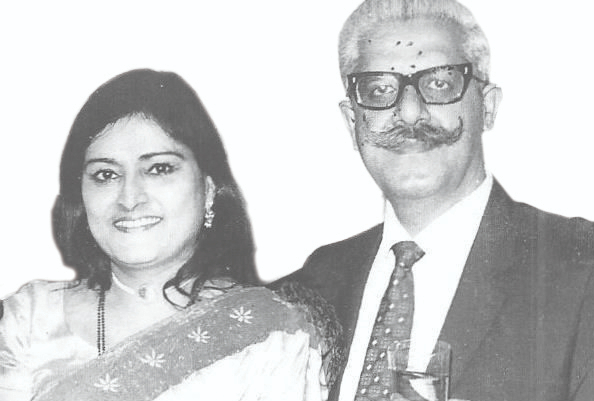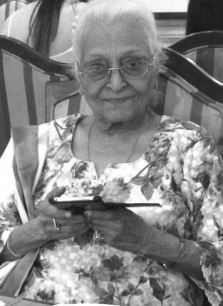
Story of life and struggle of a Sindhi lady Mohini Bhawnani and her journey from Karachi to Kolkata
By Saaz Aggawal
Gulabrai Mansukhani was a successful criminal lawyer and practiced in the Karachi High Court. The family was affluent with a home opposite the YWCA, a car and driver. Gulabrai was a member of the Masonic Lodge of England and the Grand Lodge of Scotland. He was appointed Worship Master and was awarded a gold medal by the Prince of Wales. Sadly, Gulabrai died in 1936, when his daughter Mohini was just four and her brother Prabhu was two. Gulabrai had earned well – but he had spent a lot and donated a lot. Gulibai moved into smaller quarters and bought a plot of land in Jamshed Quarters not far from Karachi Jail, from her cousin Lokumal Mirchandani, an engineer who owned the adjacent bungalow. As she began construction, the Second World War broke out and cement and other material became scarce. Money ran out. Mohini remembers going to live in the incomplete bungalow with bare girders and unfinished furniture. There were no bolts on the doors so before sleeping at night they would move chairs and tables to block it so that it could not be pushed open from outside. The windows had to be painted black, a wartime ordinance because Karachi was a target that could be bombed.
While Prabhu studied at the WB High School for Boys, Mohini went to DB High School for Girls. DB stood for Dhamibai Basantsing, whose son Bhagwansing Advani had built the school in her memory.
Mohini remembers mocking the boys, “You are at Wangan Basar School” and they would reply, “And you are at Dabroti Bedo School” to which the natural response was, “Yes, but dabroti-bedo is so much better than wangan-basar – egg with bread is so much better than brinjal with onions!”
The principal of Wadhumal Bulchand School was Chandiram B Advani and Vice Principal was Gulab Idnani – both of whom were related to Mohini’s mother. After Partition, Chandiram (whose sister Dadi Bhoji ran the Nari Shala at Shyam Niwas) was entrusted by Sadhu Vaswani to establish Mira Mission High School in Poona.
Mohini’s principal was Sona Sadarangani and she loved this bright girl who was also a tomboy who loved skating, cycling and horse riding.
Time passed, the war ended and the house was completed with money Gulibai raised by selling her jewellery. Dr. Srichand Lulla, a Shikarpuri psychiatrist, took up tenancy and Guli’s mother and brother also came to stay. In the next lane was Krishna Kunj where Sadhu Vaswani lived. Mohini remembers attending his Gita discourses and the fact that he did not permit anyone to touch his feet. So, to express their reverence for him, they would crawl and touch his wooden sandals. Sadhu Vaswani preached vegetarianism so the family took it up. Another teacher Mohini remembers is Dada Chellaram who taught them from the Guru Granth Sahib at the Gurmandar.
As Partition approached, Guli’s mama Jagatsingh Idnani, who was Attorney General of Sindh, advised her to sell the house. Mohini had just completed her matric and joined DJ Sind College but classes had been disrupted. Gulibai put her fifteen-year-old daughter on the SS Barpetta to Bombay in the care of an acquaintance, an Idnani.
Lokumal Mirchandani sold his property and left. Everyone around was selling and leaving and Gulibai found herself alone in the area. She started receiving threats against Prabhu and sent him to live with her older stepdaughter who lived in Gadi Khato and loved her children dearly. She kept a dog and slept under the bed with a dummy on the bed. On some mornings she would find a dagger in the compound with a threatening note stuck to it. One day, a displaced Muslim family entered her home forcibly with their belongings and set up house; they even started cooking. Gulibai took help from the police to have them evicted. Now she was desperate – if she left without at least something in hand, they would starve.
The people who had bought Lokumal Mirchandani’s house were Bohris who had a Hindu daughter-in-law. They took pity on Gulibai and bought the bungalow, clinching the deal at Rs.18000 for a property previously valued at Rs.70000. It was a risk to take cash – a person with a bag of money was easily plundered or killed; such cases had been reported. Gulibai was escorted to the Karachi docks by the family who had bought her house. She might have considered making a home in Bombay but her brother lived in Calcutta and Mohini had been sent ahead there. So in January 1948, Gulibai arrived in Calcutta with a bank draft received from the sale of her house and handed it over to TR Lalwani of Bank of India to encash for her.

Mohini had had her own share of adventures. The very first evening on the ship, Idnani got drunk and began making advances. She went to the ship’s captain for help and managed to keep herself safe and away from him. At the Bombay docks, Idnani stood near the ship’s exit, waiting for her. Luckily she saw Mr Captain, a Parsi friend of her father’s from the Masonic Lodge, who took her to his sister’s house in Dadar. The next day they left for Calcutta where Captain was to join a sugar mill. Gulibai had received a letter from Idnani telling her that unfortunately Mohini had got lost. Fortunately this was soon followed by her own letter telling her mother that she had arrived safely.
In Calcutta, Mohini was received by her mamo Kishinchand Bhawnani and his family. He was a businessman settled in Calcutta well before Partition, with a number of restaurants and bars including the Royal Botanical and Imperial restaurants, a soda water factory and motor parts shops. They were also Railway contractors and dealt with Hiro Jagtiani, a general manager of the Railways.
Mohini was keen to join college but her mamo was not in favour of higher education for girls. And so, when her mother arrived, they set up their own home so that Mohini could continue her education. With refugees from East Pakistan pouring into Calcutta, no houses were available and at one time they lived in a garage, sharing bathrooms with others and putting off lights and bathing in the dark for privacy.
Mohini had no migration certificate and got help from the Grand Master of the Masonic Lodge on Park Street for her college admission.
As she remembers sadly, just before the examinations, she lost her mother. Gulibai had lived under great stress for a long time. She developed gastric ulcers which worsened when she refused food, subsisting on tea. She was admitted in hospital and when Mohini needed money for treatment, TR Lalwani helped her to release funds as she was still a minor.
Mohini will never forget the condolence visit from the secretary and president of the Sindhi Panchayat. In her words:
My mother’s body was still in the house. They ordered me that I would have to go and live with my mama. When I did not reply, they threatened to outcaste me. My mother had clearly told me that in case she died, I should not go to anyone. We knew that my mama would not allow my education to continue. I gathered courage and told them, “This is not Sindh.”
My life carried on. Many years later, in 1972, I was elected secretary of that same Sindhi Panchayat, the only female among twelve committee members. I felt grateful to God.
After her mother died in 1950, Mohini sold her father’s gold medal from the Prince of Wales to pay for her and her brother’s education and daily expenses. The eight-tola medal fetched her Rs45 which was soon spent. She went to work in a school and, continuing her studies, gave a competitive examination to enrol as an engineer in the telephone office. Mohini was placed fourth among four hundred candidates and the only woman and thereafter got a job with the telephone department.
In 1957 Mohini married Sujan, her mama’s son. He had told his mother that he would marry Mohini and no one else. So, soon after her mama died, her mami approached her, and the wedding took place. Mohini was married into a wealthy family but she continued working and as the years passed, she was promoted to higher positions.
With her husband’s support, Mohini was connected with many social organizations, and served as President of Telecom Engineering Association for three consecutive years; Secretary of Business Professional Women’s Club; member of Lion’s Club and member of the Women’s Coordinating Council. In 1972 she and other volunteers of the Council took part in the rehabilitation efforts during the war of liberation of Bangladesh and cooked twenty kilos of mutton daily and delivered it to the airport. A plane would come from Kalaikunda, pick up tins of the mutton, rice and water and para-drop them for the Mukti Bahini. Mohini’s husband supported her career too, only once stopping her from attending a training program in Alcatel in Paris. Travelling is Mohini’s passion and she has been all over the world.
[author title=”Saaz Aggarwal” image=”https://sindhcourier.com/wp-content/uploads/2021/06/Saaz-Aggarwal.jpg”]Saaz Aggarwal is an independent researcher, writer and artist based in India. She is author of several books. Her body of writing includes biographies, translations, critical reviews and humour columns.[/author]
Courtesy: Saaz Aggarwal – Sindh Stories